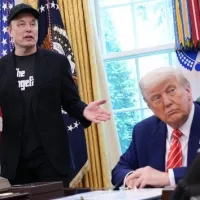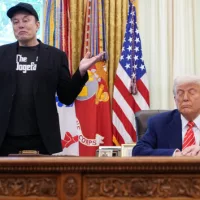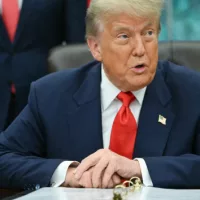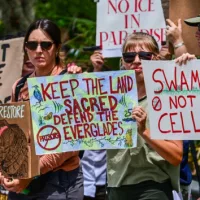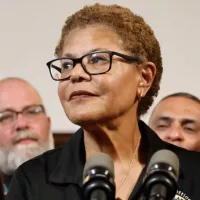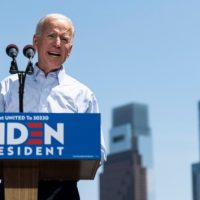
 Drew Angerer/Getty Images(WASHINGTON) — The rising tide of 2020 Democratic presidential hopefuls calling for environmental reform now includes former Vice President Joe Biden, who released his plan to tackle climate change Tuesday morning.
Drew Angerer/Getty Images(WASHINGTON) — The rising tide of 2020 Democratic presidential hopefuls calling for environmental reform now includes former Vice President Joe Biden, who released his plan to tackle climate change Tuesday morning.
Biden is calling for “a clean energy revolution and environmental justice” in his new proposal to address “the climate disaster facing the nation and our world.”
“Science tells us that how we act, or fail to act, in the next 12 years will determine the very livability of our planet. That’s why I’m calling for a Clean Energy Revolution to confront this crisis and do what America does best — solve big problems with big ideas,” Biden said in a statement.
The former vice president’s proposal pledges to go further than the climate platform undertaken by the Obama-Biden administration, and gives support to the framework of the Green New Deal being pushed by Progressive Democrats like Rep. Alexandra Ocasio-Cortez, D-N.Y., calling it a “a crucial framework for meeting the climate challenges we face.”
Ocasio-Cortez previously criticized Biden over reports he was considering a “middle ground” policy on climate change.
Biden’s proposal addresses five main goals, starting by working with Congress to make the U.S. a 100 percent clean energy economy and reaching net-zero emissions by 2050.
The proposal also calls for investing in new infrastructure that can withstand the effects of climate change — and create new jobs. The former senator, who famously commuted via Amtrak to Washington from his home in Delaware, also hopes to spark “the second great railroad revolution” with his plan, expanding high speed rail across the country.
Biden supports acting globally as well, saying he would rejoin the Paris Agreement on climate change and push every major country to undertake more ambitious climate targets.
Biden’s plan also addresses “environmental justice,” holding polluters, including fossil fuel companies, accountable for environmental damage, which has an even greater impact on low-income communities.
The proposal would mean moving the U.S. away from the use of coal, an industry whose employees largely supported President Donald Trump in 2016, in part, because he promised to protect their jobs. Biden’s campaign has put a large emphasis of winning back working class voters who supported Trump, and says the former vice president’s plan would include tools and resources to help workers displaced by a shift from coal to find and train for new jobs within their communities.
The 22-page policy lays out in detail how the former vice president plans to accomplish this — including investing $1.7 trillion in federal funds over the next 10 years, plus private-sector and state and local investments adding up to more than $5 trillion.
As for how to pay for the trillions of dollars in investments, Biden’s proposal says he would do so “by reversing the excesses of the Trump tax cuts for corporations, reducing incentives for tax havens, evasion, and outsourcing, ensuring corporations pay their fair share, closing other loopholes in our tax code that reward work not wealth, and ending subsidies for fossil fuels.”
The 2020 field’s proposals on climate change come as the party’s progressive wing, bolstered by young voters, has continued to call for candidates to take a more aggressive approach. Democrats continue to debate the best way to combat climate change, an issue that is poised to take on a greater level of importance this cycle than ever before.
A recent poll conducted by Harvard Institute of Politics of young people, ages 18 to 29, found a substantial 14-point increase from the same poll they conducted in 2015 in those who said they believed “government should do more to curb climate change, even at the expense of economic growth.”
Experts agree.
“This is the first time in our history climate change is going to be a voting issue, and a top theme of election 2020,” said Dana R. Fisher, a professor whose work centers on understanding the relationship between environmentalism and democracy, most recently studying activism and American climate politics. “There’s such momentum amongst active and progressive young Americans — they’re probably the most engaged electorate right now — because the news just keeps getting worse and worse, and the American public is listening and going to put pressure on their candidates. They’re shining a light on this, and there’s momentum for candidates to speak about the issue.”
Biden joins other candidates calling for bold action, like Gov. Jay Inslee of Washington, a politician who has made climate change the crux of his campaign.
Inslee unveiled his initiative, dubbed the “100% Clean Energy for America Plan,” last month. The proposal’s scope is sweeping — laying out 100 percent clean energy standards across three sectors: electricity, new vehicles and the construction of new buildings.
The plan would meet, and even exceed, the Intergovernmental Panel on Climate Change targets for carbon reduction that say carbon dioxide emissions must be reduced by 45 percent by 2030, reaching near-zero by 2050. The policy rollout ties together the overarching thesis of Inslee’s campaign, allying the fight against climate change with national security, health care and the economy.
“The course of inaction is the course of economic disaster,” Inslee said ahead of the plan’s rollout.
If elected, Inslee’s proposal begins on day one of his administration. It aims by 2030 to reach 100 percent zero emissions from new vehicles, zero carbon pollution from all new commercial and residential buildings and would require 100 percent carbon-neutral power across the country. By 2035, it proposes completely clean, renewable and zero-emission energy nationwide.
Inslee said he’ll aim to make sure coal industry workers, their families and their communities don’t fall through the cracks by providing education and training for clean energy jobs so they can participate in this new economy.
“These folks who have worked in the coal industry are deserving of incredible respect and dignity,” Inslee told ABC News. “They are people whose contributions of multiple generations have literally built the economy of the United States, people who are doing really hard work, and are deserving of our respect and what we’ve done in the state of Washington, which is to make sure that as we go through this transition, that we also make sure we are caring for and embracing these communities to make sure they have a future as well.”
He seeks to accomplish his plan’s goals through tax incentives for using clean technologies and more renewable energy in electricity delivery, vehicle manufacturing and construction of new buildings; deploying natural resources — wind and solar — on public lands, implementing a new standard for clean cars and promoting alternative fuels.
Inslee is no newcomer to such efforts. His model draws from measures he’s undertaken with success in his own state, experts said.
“Gov. Inslee has been a leading advocate for transitioning America to clean, renewable energy for decades. This is not a newfound passion of his,” said Mark Jacobson, a climate expert and Stanford University professor, who described Inslee’s initiatives as “feasible, bold and necessary first steps.”
His plan also received praise from another governor-turned-presidential contender, California’s Jerry Brown, who issued a challenge to other candidates in the race to prioritize the issue of climate change.
“I commend Governor Inslee for presenting a bold climate action plan. It is time for the other candidates to also confront global warming and the profound threat it constitutes for America, and yes, for the entire world. Time is running out.” Brown said in statement provided to ABC News.
Still, Inslee’s plan would require mammoth mobilization by the federal government.
Inslee’s team likens the initiative to President John F. Kennedy’s “Moonshot.” It is a fitting characterization that seems to anticipate, as there was then, public disquiet about the cost and value of such radical efforts. Democrats addressing the new climate fight through eliminating coal power and retiring its plants have in the past run the risk of alienating Rust Belt constituents.
But, experts have said, regardless of who’s in the White House this evolution is vital.
“Here’s the take-home message: Coal is dead, basically. And that’s no matter who sits in the White House,” Fisher told ABC News. “Coal is being phased out everywhere. At this point, people just want to deal with the fact that this transition has to happen and there are these opportunities to initiate and have new clean energy and clean technology jobs. There’s no question in my mind.”
Several other candidates have come forward with bold plans of their own. Notable among them, former Texas Rep. Beto O’Rourke, who announced his four-pillar, $5 trillion plan to combat climate change just days before Inslee.
New Jersey Sen. Cory Booker has released the specifics of what he calls his “environmental justice plan,” which he says would take “immediate steps” to strengthen the power of the Environmental Protection Agency, which he accuses the Trump administration of “gutting.”
“Right now, under this president, the number of actions that are being taken against polluters has gone dramatically down,” Booker said during a campaign stop in Columbia, South Carolina, last Friday.
Massachusetts Sen. Elizabeth Warren speaks often of the “climate crisis” on the campaign trail, and released a plan earlier this month on protecting public lands, which would roll back many of Trump’s environmental policies, halt offshore drilling on publicly owned lands and restore original boundary lines for two national monuments that were shrunk under the current administration.
Warren and a number of her Senate colleagues running for president, including Booker, Sens. Bernie Sanders, Kirsten Gillibrand and Kamala Harris, are all either co-sponsors of or support the Green New Deal.
On his campaign website, Sanders describes climate change as the “the single greatest threat facing our planet,” while Booker refers to it as an “economic and national security crisis” on his Senate web page.
But even with a broad consensus among the Democrats running for president that climate change is a threat that requires a strong response, there is disagreement on the most effective way to do it.
Sen. Amy Klobuchar said she sees the Green New Deal as “aspirational” and former Colorado Gov. John Hickenlooper has come out as publicly opposing the proposal, saying it “sets unachievable goals,” despite labeling climate change as the “defining challenge of our time.”
Inslee’s campaign has been somewhat critical of O’Rourke’s plan for its so-called “borrowed rhetoric.”
“If you’re going to fight this battle, you’ve got to be willing to fight the gas industry. I’m the candidate who hasn’t voted for offshore drilling and taken a half million dollars. You have to be willing to stand up against that industry,” Inslee said. “And I’m clearly the candidate who’s got the gumption, who’s willing to do that.”
When asked about the Inslee campaign’s remarks on his record, and on his current climate plan, O’Rourke’s campaign declined further comment.
“I welcome anyone who is following my lead,” Inslee added. “People will have to ask if other candidates have ever actually introduced legislation or really provided leadership because I think this does require a huge lift and requires a passionate voice. And I’ve been providing this for a long period of time, I’m not just a kind of latecomers to this issue.”
John Delaney, the first Democrat to announce his candidacy back in July 2017, recently unveiled a $4 trillion plan taking aim at the fossil fuel industry by proposing a steep tax on products and services that emit carbon pollution while eliminating government subsidies for fossil fuel corporations unless they invest in a controversial technology that captures pollution out of the air and stores it.
Proposing such a bill in Congress would be a major legislative hurdle, but could create opposition within the fossil fuel industry if natural gas producers see it as a method of gaining an advantage over the coal sector, according to Barry Rabe, a professor at the University of Michigan who specializes in environmental policy.
“If I’m a natural gas producer,” Rabe said, “I’m looking at this and thinking, ‘Wow, there’d be a carbon price that would further crowd out coal. Maybe I’m a net winner on this because the carbon content of natural gas is so much lower than coal.'”
Additionally, Delaney’s proposal includes major investments in green energy programs at the Department of Energy, bolstering renewable energy tax credits, new grant programs and the establishment of the “Climate Corps” that would create programs for recent high school graduates to work on green initiatives in their communities.
“It’s definitely not the most aggressive plan,” said Fisher, the University of Maryland professor. “I think this one is trying to get more centrist voters.”
Copyright © 2019, ABC Radio. All rights reserved.






